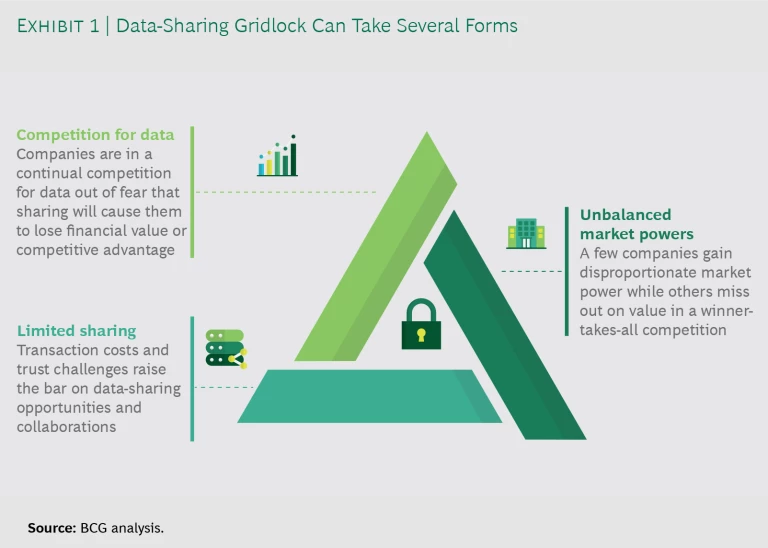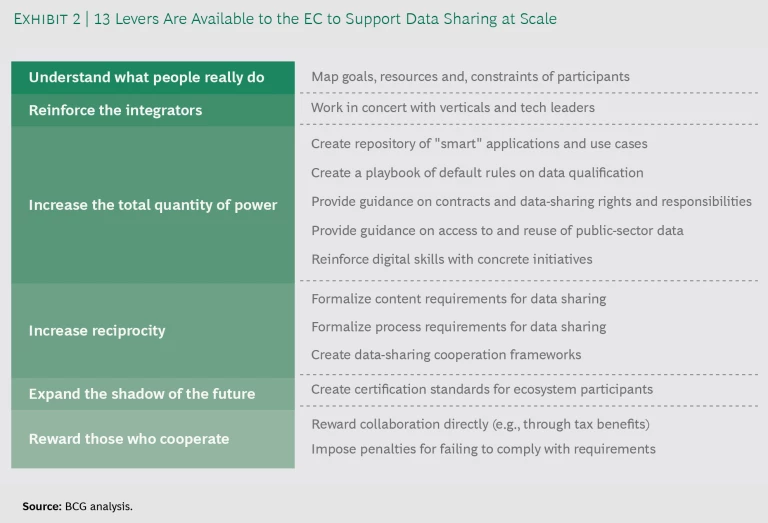This is the seventh article in a multipart series.
On November 25, 2020, the European Commission issued the Data Governance Act, the first concrete proposal regarding the implementation of its European Data Strategy, announced earlier in the year. The good news is that the EU recognizes the pressing importance of developing and carrying out a pan-European data strategy, with the primary aim of boosting the continent’s global competitiveness in artificial intelligence (AI) in order to keep pace with the US and China on this key strategic imperative. Less encouraging is the fact that the act may not do enough to break down constraints on data sharing and spur companies to explore the possibility of creating or participating in data-sharing platforms and ecosystems.
Building a strong data economy has emerged as a priority in recent years. According to the UN Conference on Trade and Development’s 2019 Digital Economy Report, “businesses that build digital platforms have a major advantage in the data-driven economy.” The report found that the US and China account for half of global spending on the Internet of Things (IoT), more than 75% of the cloud computing market, and as much as 90% of the 70 largest digital-platform companies’ market capitalization.
In Europe, however, a 2018 EC survey of 129 companies found that 60% did not share data with other companies and 58% did not reuse data obtained from other companies. Little surprise, then, that European digital platforms make up less than 10% of the market capitalization of the biggest digital-platform companies.
READ THE OTHER ARTICLES IN THE SERIES
- Innovation, Data, and the Cautionary Tale of Henrietta Lacks
- Contact Tracing Accelerates IoT Opportunities and Risks
- The Risks and Rewards of Data Sharing for Smart Cities
- What B2B Can Learn from B2C About Data Privacy and Sharing
- How Far Can Your Data Go?
- Simple Governance for Data Ecosystems
- Sharing Data to Address Our Biggest Societal Challenges
- Where Is Data Sharing Headed?
-
The New Tech Tools in Data Sharing
Data is the fuel for advanced technologies such as AI that are reshaping national and regional competitiveness. The volume of data is growing fast, especially from IoT— Ericsson projects that the number of IoT-connected devices will more than double, from 11 billion in 2019 to 25 billion by 2025—and growing numbers of companies around the world are engaging in commercial activities that are rooted in data and data sharing. Public policy that puts Europe on a single regulatory footing in the data economy holds many advantages over a fragmented country-by-country approach—not least for European companies seeking to compete with leaders from the US and China.
With the Data Governance Act, the EC is targeting a value pool of data access and reuse estimated at 1% to 2.5% of Europe’s GDP and is aiming to increase the annual economic value of data sharing from €7 billion to €11 billion by 2028.
Where Do We Stand Today?
The Data Governance Act is a first step in bringing the EC’s initial strategy on data and data sharing to life. The goals of the European Data Strategy are to make the EU “a leader in a data-driven society” and to create “a single market for data [to] allow it to flow freely within the EU and across sectors for the benefit of businesses, researchers and public administrations.” To encourage the establishment of trustworthy data-sharing systems, the act focuses on the following:
- Reuse of Public-Sector Data. The act would create a common public-data standard by setting conditions for the reuse of certain categories of protected public-sector data within the EU.
- Trustworthy Providers. The act proposes a notification and supervisory framework for data-sharing service providers.
- Data Altruism. The act would establish a framework for the voluntary registration of entities that collect and process data made available for altruistic purposes.
With the Data Governance Act, the EC is aiming to increase the annual economic value of data sharing from €7 billion to €11 billion by 2028.
The act also contemplates the creation of a European Data Innovation Board, an expert group whose mandate would be to steer data governance and facilitate the development of best practices across member-state governments.
The act partially addresses three of the European Data Strategy’s six high-level goals for removing constraints on data sharing:
- Facilitate the setup of a procurement marketplace for data-processing services.
- Allow free access and reuse of high-value publicly held data sets across the EU.
- Adopt legislative measures on data governance, access, and reuse.
It does less to advance the other three:
- Invest in sharing infrastructure, tools, architectures, and governance mechanisms.
- Foster the rollout of common European data spaces in crucial sectors.
- Empower data control and invest in digital skills and capacity building for SMEs.
While the Data Governance Act focuses primarily on providing an overarching legislative structure to enable future initiatives, it does not offer a compelling rationale or incentives to encourage them. Perhaps these are to follow in separate legislative proposals. We hope so, because their absence is an omission that undermines the EC’s ability to fully unlock the potential of data sharing across Europe.
The EC can go further to create the conditions that would facilitate private-sector data sharing and encourage companies to act in productive ways as the data economy takes shape. It can also avoid the pitfall of complicated legislative measures and regulatory frameworks. Here’s how.
A Smart Simplicity Approach
As we observed recently in a different context, data sharing is primarily an exercise in collaboration, and it is easy for barriers to arise that limit sharing and lead to data gridlock . (See “Data-Sharing Ecosystems and Barriers.”)
Data-Sharing Ecosystems and Barriers
Ecosystem orchestrators set the rules, coordinate the activities of the other participants, aggregate their data and expertise, and deliver a range of products or services to the end customer. Contributors, which may be participants in multiple ecosystems, provide their data and services or build and sell applications with the help of the ecosystem’s data. Enablers provide infrastructure for the ecosystem, including connectivity, security, and computing power. Governments, citizens, and civil society are also involved as regulators, data contributors, and customers.
All of these players have concerns that raise barriers to data sharing. The biggest sources of concern are trust and privacy, transaction costs, competitive concerns, and worries over missed or lost financial opportunity.
- Trust and Privacy. This barrier is rooted in the fear that data will be mishandled, misused, or mis-shared. Poor technology, weak governance, and actual data breaches can all lead to data being used for purposes that were not agreed upon by the originator of the data and others in the ecosystem.
- Transaction Costs. These costs underlie every data exchange, and problems can be both technological and procedural in nature. Technological impediments include poor connectivity, mismatched standards, and constraints on interoperability. Procedural barriers can involve mismatched skills, organizational complexity, or ambiguous rules. Technological advances such as 5G mobile connectivity, better industry standards, broker platforms, and data fusion tools are emerging to tackle the former. Sharing governance can tackle the latter. But as more heterogeneous IoT data comes online, new challenges are likely.
- Competitive Concerns. The data landscape is still mostly unmapped, and new, unforeseen use cases appear every day. Companies rightly fear surrendering competitive advantage along with strategic data. Incumbent contributors to an ecosystem may worry that competitively sensitive information will be released to rivals. New digital entrants may worry about digital giants copying their tools or poaching their talent. All participants may worry about ecosystem orchestrators capturing a disproportionate portion of the value.
- Lost Financial Opportunity. Another ramification of the unmapped landscape is the possibility that sharing data may cause financial opportunities to be overlooked. This could result from a failure to recognize data’s downstream value, from misallocation of value among an ecosystem’s participants, or from neglected opportunities to develop end-to-end data services internally. For example, vendors and customers can work together to coordinate logistics, rationalize inventory, and even codesign products, but the benefits and investments may not accrue evenly across the supply chain.
Data gridlock can take several forms. (See Exhibit 1.)
- Competition for Data. Companies fear that sharing data will cause them to lose financial value or competitive advantage, so they are continually competing for data and data access.
- Unbalanced Market Powers. A few companies—usually digital giants and ecosystem orchestrators—gain disproportionate market power in a winner-takes-all competition for data. Others miss out on value.
- Limited Sharing. Transaction costs and trust challenges raise the bar on data- sharing opportunities and collaborations.
Simple and effective rules of governance can help prevent data gridlock. As the EC moves forward with its data strategy, it would benefit from following six rules that we refer to collectively as Smart Simplicity. These rules promote cooperation by helping companies make sense of organizational complexity and empowering participants to improve data-sharing performance.
Within this framework, we have identified 13 potential levers to facilitate sharing and avoid gridlock. Many have been tried in one form or another by governments in Europe and elsewhere. These levers do not constitute a policy recommendation; rather, they are intended to serve as illustrations of the Smart Simplicity approach from which the EC may draw inspiration. (See Exhibit 2.)
Rule 1. Understand what people really do. This helps identify the factors that create a situation in which everyone wins and the objectives of all stakeholders are aligned. The goal for Europe is to create the right conditions for the data-sharing economy to grow to scale under EC guidelines.
To understand the conditions needed to unlock a data-sharing virtuous circle, the EC can map the goals, resources, and constraints of all the participants in a data-sharing ecosystem. (This would require coming to grips with the constraints on data sharing to date.) It can then set the rules that would foster the necessary attitudes and behaviors.
This does not mean setting up large-scale enabling technologies, since the EC does not have the necessary agility and expertise (compared with leading tech companies, for example) to invest in rapidly changing technology at scale. Furthermore, there are specific governance mechanisms for data sharing and use cases that can best be administered in an ecosystem, rather than at a national or multinational level. For example, while a government can set the basic requirements regarding personal privacy, B2B ecosystems can go one step further to protect nonpersonal but still sensitive competitive information. In China, the government sets the “rules of the playground” for data sharing and then lets digital leaders and industry incumbents determine how best to share data to generate value.
Rule 2. Reinforce the integrators. The orchestrators and enablers of a data ecosystem often play the role of integrators—participant companies whose influence makes a difference in the work of others. Integrators bring other participants together and drive processes. (See the sidebar for descriptions of orchestrators, enablers, and contributors.) The Data Governance Act aims to build a foundation for data sharing by encouraging trusted intermediaries to take on the role of integrators. To establish the legitimacy of tech enablers, specifically, in the eyes of other participants, it would help to certify that these companies are operating under EU rules and are upholding EU values.
Besides what is recommended in the Data Governance Act, the EC has two additional opportunities to strengthen integrators. First, it can use its convening power to bring tech companies and other industry leaders together to find opportunities for collaboration and data sharing. Second, it can continue or improve its funding programs (such as Horizon 2020) for use cases supported by data sharing. This would help ensure buy-in and create the right conditions for ecosystem contributors to select their own integrators (rather than having regulators select their integrators for them).
Rule 3. Increase the total quantity of power. Governance systems should make data sharing attractive by providing contributors and enablers with tools (such as the following) while protecting their interests.
First, the EC can highlight “smart” applications and use cases that showcase the kinds of value that data sharing can unlock. By making the benefits of sharing obvious and concrete to everyone, a registry of such applications and use cases has the potential to level the playing field while giving contributors the knowledge they need to identify which data to share for which objective.
The EC can go further to create the conditions that would facilitate private-sector data sharing and encourage companies to act in productive ways as the data economy takes shape.
For example, the German government’s mFUND research initiative centralizes key use cases in order to spur the development of data-based business models for smart mobility. The initiative aims at incentivizing digital innovations in the transport sector, such as new navigation services, smart journey planners, and highly accurate weather apps. Data access and sharing are promoted according to open-data principles and are supported technically by centralized access points for mobility-related data. More than 100 projects involving more than 300 individual partners—including business enterprises, research institutions, and universities—have already been funded.
Second, the EC can create a playbook that provides general guidelines and default rules on qualifying and assessing the value of data.
Third, the EC can provide clear legal explanations and tools that build confidence in, and reduce resistance to, data sharing and help companies navigate its complexities. In Japan, the Ministry of Economy, Trade and Industry’s “Contract Guidance on Utilization of AI and Data” summarizes factors for companies to consider when drafting a contract involving the use of AI or data. The guidance provides examples of data utilization contracts and in-depth explanations of basic concepts regarding the rights and responsibilities associated with AI-based software and the use of data.
Fourth, the EC can supplement its newly created mechanism for reuse of public-sector data by showcasing the value of this data and encouraging the sharing, ultimately, of private-sector data as well. Denmark has brought together efforts to promote open data across government siloes in order to encourage access and reuse. It provides a common architecture for sharing and reusing public-sector data and a clear framework for the conditions of use. The government also draws attention to the value of using data through hackathons and the establishment of data exchange spaces for public and private entities.
Finally, the EC can clarify its goal of reinforcing digital skills with more concrete initiatives. In the UK, the Digital Skills Partnership brings together public, private, and not-for-profit organizations to boost the skills needed for a world-class, inclusive digital economy. The Data Skills Taskforce works with private partners, the Department for Digital, Culture, Media and Sport, and public bodies such as the Tech Partnership to enhance data analytics skills in the workforce.
Rule 4. Increase reciprocity. The success of each participant in a data ecosystem depends on the success of others. Good governance makes obvious the benefits of sharing and helps prevent members from benefiting without also contributing.
The EC has an opportunity to protect small players through data-sharing cooperation frameworks that reduce rivalries and competition and promote trust. The Netherlands’ Dare-2-Share Co-operation Agreement aims at helping entrepreneurs “establish agreements in an honest and reliable way in the ‘collaboration in innovation’ phase—where data are shared between large and small companies.” The initiative pays particular attention to relationships between small players and larger entities. It defines the legal standards, national and international laws, and regulations that parties need to consider in their agreements.
As the EC moves forward with its data strategy, it would benefit from following six rules that promote cooperation by helping companies make sense of organizational complexity and empowering participants to improve data-sharing performance.
Going a step further than its proposed authorization framework for data shared for altruistic purposes, the EC can formalize requirements regarding content (data quality thresholds or standard formats) and process (security, transparency, and privacy). This would facilitate interoperability and reassure parties that comparable quality thresholds and standards have been met, thus increasing the willingness to share. The government of Singapore established its Trusted Data Sharing Framework to boost data sharing, drive the development of new products and services, and foster confidence that data is safeguarded. The framework consolidates a common data-sharing syntax to help businesses establish baseline practices on sharing strategies and legal and regulatory requirements. It contains a guide to data valuation, technical models, and processes to ensure transparency during and after data exchange.
Rule 5. Expand the shadow of the future. Making clear the potential consequences of participants’ behavior and decisions is a cornerstone of collaboration. Ecosystem participants need to see how success is achieved by contributing to the success of others. The EC can create accreditation standards and certify ecosystems and companies that meet them—and establish the potential for lost accreditation if the standards do not continue to be met. Japan’s Certification System for data-sharing platforms fosters trust among data sharers and allows certified companies to request data from others, thus promoting reciprocity.
Rule 6. Reward those who cooperate. Direct incentives for sharing data (and disincentives for hoarding) through rewards and penalties are powerful motivators. The EC can create tax incentives and administrative advantages for companies that comply with standard requirements and tax penalties for those that do not. The government of Japan supports data-sharing platforms through its Certification System with tax incentives and administrative guidance. It can also revoke accreditation in some cases.
The Data Governance Act addresses a clear opportunity: increasing data sharing to achieve valuable use cases and establish Europe’s digital competitiveness. The act is a good first step toward the implementation of the European Data Strategy, but it still leaves room for complementary initiatives that would encourage companies to “walk the talk.” A Smart Simplicity approach can help the EC clarify and achieve its goals by working with individual industries and tech leaders to reduce the threat of data-sharing gridlock and by focusing on the most high-impact initiatives. Similar efforts have been deployed in Europe and elsewhere, and the EC can draw on their success to promote data sharing at scale.














